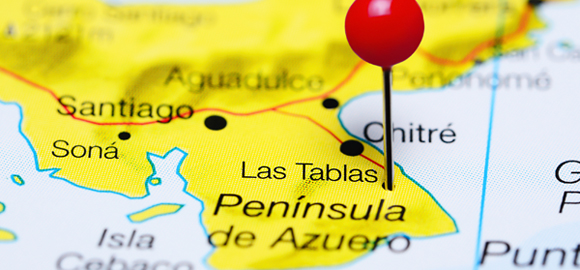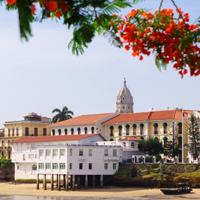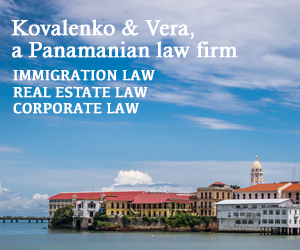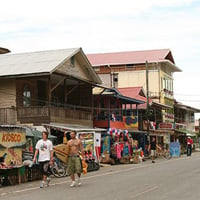Las Tablas, Panama
Last updated on May 14, 2025
Summary: Expats, digital nomads and retirees discuss what it is like to live in Las Tablas, Panama: Cost of living, Finding a home, Meeting People and more.

What do I need to know about living in Las Tablas?
When we asked people what advice they would give someone preparing to move to Las Tablas, they said:
"Expats considering retirement in Las Tablas, should be aware of several key factors. Firstly, the cost of living is relatively low compared to many Western countries, making it an attractive option for retirees. However, it's important to understand that the local economy is primarily agricultural, which may limit job opportunities if you plan to work during retirement. The official language is Spanish, so learning the language will be beneficial, although English is also widely spoken. The healthcare system in Panama is generally good, with both public and private options available. However, it's advisable to have a comprehensive health insurance plan. Las Tablas is known for its warm, tropical climate, with a rainy season from May to November. It's also renowned for its vibrant culture and festivals, particularly the Carnival in February. The town is relatively small and rural, offering a slower pace of life, which can be a significant change if you're used to living in a bustling city. The local cuisine is a blend of Spanish, African, and Indigenous influences, with seafood being a staple. It's also worth noting that while Panama uses the U.S. dollar, credit cards are not widely accepted in smaller towns like Las Tablas, so it's essential to have cash on hand. Regarding residency, Panama offers several visa options for retirees, including the Pensionado visa, which provides several discounts for retirees. However, the process can be complex and may require the assistance of a lawyer. Finally, while Panama is generally safe, like any place, it has crime. Therefore, it's important to take standard precautions to protect yourself and your property," remarked one expat who made the move to Las Tablas.
 Kovalenko & Vera Attorneys at Law in Panama
Kovalenko & Vera Attorneys at Law in PanamaConnect
Kovalenko & Vera is a Panamanian law firm that specializes in immigration law, corporate law, real estate law, banking, contract negotiation, taxes and flag registry. With more than 20 years of professional practice, Kovalenko & Vera builds lasting relationships with our clients to ensure your interests are safeguarded.
Click connect to have our partner contact you via e-mail and/or phone.
 Kovalenko & Vera Attorneys at Law in Panama
Kovalenko & Vera Attorneys at Law in PanamaKovalenko & Vera is a Panamanian law firm that specializes in immigration law, corporate law, real estate law, banking, contract negotiation, taxes and flag registry. With more than 20 years of professional practice, Kovalenko & Vera builds lasting relationships with our clients to ensure your interests are safeguarded.
Connect
Click connect to have our partner contact you via e-mail and/or phone.
What do I need to know before moving to Las Tablas?
When we asked people what advice they would give someone preparing to move to Las Tablas, they said:
"Las Tablas, is a small town known for its rich culture, traditional festivals, and friendly locals. Before moving, expats should know that Spanish is the primary language spoken in Las Tablas, so learning the language will be beneficial. The cost of living is relatively low compared to many Western countries, but it's essential to have a clear understanding of your budget and financial situation. The healthcare system in Panama is generally good, but it's advisable to have comprehensive health insurance. The climate in Las Tablas is tropical, with a wet and dry season, so expats should be prepared for high humidity and rainfall during the wet season. Public transportation is available but not always reliable, so having a personal vehicle can be beneficial. The town is safe, but like anywhere, it's important to take standard precautions to protect yourself and your property. Las Tablas is famous for its traditional festivals, especially the Carnival, which is one of the biggest and most vibrant in the country. The local cuisine is a blend of Spanish, African, and Indigenous influences, with seafood being a staple. The pace of life in Las Tablas is slower than in larger cities, which can be a significant change for some expats. It's also worth noting that while the town has basic amenities, it lacks the variety of shopping and entertainment options found in larger cities. Finally, it's crucial to understand the visa and residency requirements before moving to Panama. It's recommended to consult with a legal expert or immigration consultant to ensure all paperwork is correctly completed," wrote a member in Las Tablas.
How do I find a place to live in Las Tablas?
We asked expats how they chose their neighborhood and found a place to live. They answered:
"Finding a place to live in Las Tablas, involves several steps. First, you need to determine your budget and the type of accommodation you're looking for. This could range from a small apartment to a larger house, depending on your needs and financial capabilities. Next, you should research the different neighborhoods in Las Tablas to find one that suits your lifestyle and preferences. Some areas might be closer to amenities like shops, restaurants, and schools, while others might offer a quieter, more residential atmosphere. Once you have a clear idea of what you're looking for, you can start your search. There are several online real estate platforms where you can find listings for properties in Las Tablas, such as Encuentra24 and Compreoalquile. These websites allow you to filter your search based on factors like price, location, and property type. In addition to online searches, you might also want to consider hiring a local real estate agent. They can provide valuable insight into the local market, help you negotiate prices, and guide you through the legal process of renting or buying a property in Panama. Visiting Las Tablas in person is also a good idea if possible. This allows you to view properties firsthand and get a feel for the different neighborhoods. You can also check local newspapers and community bulletin boards for rental or sale listings. Once you've found a property you're interested in, make sure to thoroughly inspect it and ask any necessary questions. If you're planning to rent, inquire about the terms of the lease, including the duration, monthly rent, and what's included (like utilities or maintenance fees). Finally, if you decide to proceed with a property, you'll need to complete the necessary paperwork. This typically involves signing a lease agreement for rentals or a purchase agreement for sales. It's recommended to have a lawyer review these documents to ensure your interests are protected. Remember, finding a place to live in a new country can take time and patience, so don't rush the process. Take the time to find a place that truly feels like home," remarked one expat who made the move to Las Tablas.
What is a typical expat home or apartment like in Las Tablas?
"Expat homes in Las Tablas, are typically spacious and comfortable, often featuring modern amenities. Many of these homes are designed with an open-concept layout, allowing for plenty of natural light and air circulation. The living areas often have high ceilings and large windows, offering stunning views of the surrounding landscape. The kitchens are usually fully equipped with modern appliances and ample storage space. Bedrooms are generously sized, often with en-suite bathrooms. Outdoor spaces are also a common feature, with many homes boasting private gardens, patios, or balconies. In terms of location, many expat homes are situated in safe, quiet neighborhoods, often within walking distance to local shops, restaurants, and other amenities. Some homes may also be located in gated communities, offering additional security and often access to shared amenities like swimming pools, gyms, and social areas. Despite the modern comforts, these homes often incorporate elements of traditional Panamanian architecture, such as terracotta roof tiles and tropical hardwood finishes. This blend of modern and traditional design helps to create a unique and comfortable living environment for expats in Las Tablas," remarked one expat living in Las Tablas, Panama.
What is the average cost of housing in Las Tablas?
If you are thinking about moving to Las Tablas, cost of living in probably a key consideration. Expats commented about the cost of housing:
"The average cost of housing in Las Tablas can vary greatly depending on the type and location of the property. For a modest home in the city center, prices can start around $100,000. However, for larger, more luxurious homes or properties with ocean views, prices can easily exceed $300,000. Renting a property in Las Tablas is also an option, with monthly rents for a one-bedroom apartment in the city center typically ranging from $400 to $600. Please note that these are estimated prices and actual costs may vary," remarked one expat who made the move to Las Tablas.
How do I meet people in Las Tablas?
When we asked people living in Las Tablas about club and activities where newcomers can meet others, they responded:
"Expats in Las Tablas often join local clubs and organizations to meet people and immerse themselves in the local culture. These can include language exchange clubs, where they can practice their Spanish and help locals with English, or sports clubs such as soccer or surfing, which are popular in the area. There are also various cultural and community groups that expats can join. These can range from art and music groups to volunteering organizations. Participating in these groups not only allows expats to meet people, but also to contribute to the local community and learn more about Panamanian culture. In addition to joining clubs and organizations, expats often meet people through social events and gatherings. These can include local festivals, concerts, and other public events. Many expats also meet people through their work or by simply striking up conversations with locals in cafes, restaurants, or other public places. Another popular way for expats to meet people in Las Tablas is through online platforms and social media groups. There are several online communities and forums for expats living in Panama, where they can connect with others, ask questions, and share experiences. Lastly, taking classes or workshops is another great way for expats to meet people. This could be a cooking class, a dance class, or a workshop on Panamanian history or culture. Not only does this provide an opportunity to learn something new, but it also provides a social setting where expats can meet and interact with others who share similar interests," explained one expat living in Las Tablas, Panama.

Kovalenko & Vera is a Panamanian law firm that specializes in immigration law, corporate law, real estate law, banking, contract negotiation, taxes and flag registry. With more than 20 years of professional practice, Kovalenko & Vera builds lasting relationships with our clients to ensure your interests are safeguarded.
Click connect to have our partner contact you via e-mail and/or phone.

Kovalenko & Vera is a Panamanian law firm that specializes in immigration law, corporate law, real estate law, banking, contract negotiation, taxes and flag registry. With more than 20 years of professional practice, Kovalenko & Vera builds lasting relationships with our clients to ensure your interests are safeguarded.
Click connect to have our partner contact you via e-mail and/or phone.
What should I bring when moving to Las Tablas?
People living in Las Tablas were asked what three things they wish they had brought and three they wish they had left behind. They wrote:
"When moving to Las Tablas, you should pack lightweight and breathable clothing due to the tropical climate. Include items like shorts, t-shirts, and sundresses. Don't forget to pack a good pair of walking shoes for exploring the city and surrounding areas. A hat, sunglasses, and plenty of sunscreen are also essential to protect yourself from the strong sun. You should also pack a lightweight rain jacket or umbrella, as Panama has a rainy season. If you plan on visiting the beach, pack your swimsuit, beach towel, and snorkeling gear if you have it. For any formal occasions or dining out, pack a few smart-casual outfits. It's also a good idea to pack a few warmer items, like a light sweater or jacket, for cooler evenings or air-conditioned places. Don't forget to pack all necessary toiletries, prescription medications, and a basic first-aid kit. However, keep in mind that you can buy most of these items locally. Pack a reliable insect repellent to protect against mosquitoes. Also, consider packing a reusable water bottle to stay hydrated. Lastly, remember to pack all necessary documents, such as your passport, driver's license, and any necessary visas or work permits. It's also a good idea to have copies of these documents. Remember, it's always better to pack light and buy what you need locally. This not only makes traveling easier, but it also supports the local economy," commented one expat who made the move to Las Tablas.
Where should I setup a bank account in Las Tablas?
We asked expats in Las Tablas what banks they use and there advice about banking. They advised:
"Expats considering retirement in Las Tablas, should be aware of several key factors. Firstly, the cost of living is relatively low compared to many Western countries, making it an attractive option for retirees. However, it's important to understand that the local economy is primarily agricultural, which may limit job opportunities if you plan to work during retirement. The official language is Spanish, so learning the language will be beneficial, although English is also widely spoken. The healthcare system in Panama is generally good, with both public and private options available. However, it's recommended to have a comprehensive health insurance plan. Las Tablas is known for its warm, tropical climate, with a rainy season from May to November. It's also renowned for its vibrant culture and festivals, particularly the Carnival in February. The city is relatively safe, but like anywhere, it's important to take standard precautions to protect yourself and your property. The local cuisine is a mix of Spanish, African, and Indigenous influences, with seafood being a staple. The city is also known for its rum production. Public transportation is available, but many expats choose to drive. If you plan to drive, you'll need to obtain a Panamanian driver's license. Finally, it's important to understand the visa and residency requirements. Panama offers several visa options for retirees, including the Pensionado visa, which provides several benefits such as duty-free imports and discounts on various services. However, the process can be complex and may require the assistance of a lawyer," said one expat in Las Tablas.
Will I be able to find a job in Las Tablas?
When we asked people about industries and career opportunities in Las Tablas, they reponded:
"In Las Tablas, foreigners often find employment in various sectors. Many work in the tourism industry, serving as tour guides, hotel managers, or restaurant staff. Some foreigners are employed in the real estate sector, helping other expats find suitable housing or investment properties. Teaching English is another common job for foreigners, either in local schools or through private tutoring. Additionally, some foreigners work remotely in various fields such as IT, marketing, or writing, thanks to the increasing popularity of digital nomadism. Lastly, there are also opportunities for foreigners to volunteer or work in local community projects or non-profit organizations," commented one expat who made the move to Las Tablas.
What is life like in Las Tablas?
When we asked people living in Las Tablas what life is like and how people spend their time, they said:
"Life for expats and digital nomads in Las Tablas, is often described as relaxed and laid-back. The small town offers a slower pace of life, with a strong sense of community and local culture. Expats can enjoy the beautiful beaches, local festivals, and traditional Panamanian cuisine. The cost of living is relatively low, making it an attractive destination for those looking to stretch their budget further. Despite its small size, Las Tablas is well-equipped with modern amenities, including reliable internet, making it suitable for digital nomads. The town is also known for its friendly locals who are welcoming to foreigners, making it easier for expats to integrate and feel at home. However, it's worth noting that Spanish is the primary language spoken in Las Tablas, so expats and digital nomads might need to learn the language or find ways to communicate effectively. The town is also quite remote, which might be a challenge for those who are used to city life or need to travel frequently for work. Overall, Las Tablas offers a unique blend of tranquility, cultural immersion, and affordability, making it an appealing choice for expats and digital nomads seeking a different pace of life," explained one expat living in Las Tablas, Panama.
What do expats in Las Tablas appreciate most about the local culture?
"Expats in Las Tablas, appreciate the warm and welcoming nature of the local people, who are always ready to help and make them feel at home. They love the relaxed pace of life, which is a stark contrast to the hustle and bustle of city living. The rich cultural heritage, particularly the traditional music and dance, is another aspect that expats find fascinating. They also appreciate the local cuisine, which is a blend of indigenous, Spanish, and Afro-Caribbean influences. The strong sense of community and the importance of family in the local culture is something that resonates with many expats. Lastly, the beautiful natural surroundings, including the beaches and the countryside, add to the charm of the local culture," remarked one expat who made the move to Las Tablas.
What do expats find most challenging?
"Expats in Las Tablas often find the language barrier to be the most challenging aspect of the local culture, as Spanish is the primary language spoken and not everyone is fluent in English. They may also struggle with the slower pace of life, which is a stark contrast to the hustle and bustle of many Western cities. The heat and humidity can be difficult to adjust to, especially for those from cooler climates. Additionally, expats may find it challenging to navigate the local bureaucracy, which can be complex and time-consuming. The cultural emphasis on relationships and personal connections can also be difficult for expats who are used to more transactional interactions. Lastly, while Panamanians are generally friendly and welcoming, it can take time for expats to fully integrate into the local community and social circles," commented one expat who made the move to Las Tablas.
Is there a lot of crime in Las Tablas?
We asked people if there is a lot of crime. They answered:
"Las Tablas, generally has a lower crime rate compared to other regions in the country. It is known for its peaceful environment and friendly locals. However, like any other place, it is not completely free from crime. Petty crimes such as pickpocketing or bag snatching can occur, particularly in crowded areas. Violent crimes are relatively rare, but it's always important for residents and visitors to stay vigilant and take necessary precautions. The local police force is active and responsive in maintaining safety and security. Overall, Las Tablas is considered a safe place to live and visit," said one expat who made the move to Las Tablas.
"No. But there are petty crooks here and there, and they do pay attention to "rich" Americans," explained one expat living in Las Tablas, Panama.
Is there a lot of diversity? Are people in Las Tablas accepting of differences?
"Las Tablas is a culturally rich area with a blend of indigenous and Spanish influences. The population is primarily of mestizo (mixed indigenous and Spanish) descent, but there is also a presence of Afro-Panamanians and indigenous groups. The people of Las Tablas are known for their warm hospitality and acceptance of differences. They are proud of their diverse cultural heritage and are generally open to different cultures and perspectives. However, like any place, individual attitudes can vary. The city is particularly famous for its vibrant festivals, which showcase its cultural diversity and inclusivity," remarked one expat living in Las Tablas, Panama.
 Kovalenko & Vera Attorneys at Law in Panama
Kovalenko & Vera Attorneys at Law in PanamaConnect
Kovalenko & Vera is a Panamanian law firm that specializes in immigration law, corporate law, real estate law, banking, contract negotiation, taxes and flag registry. With more than 20 years of professional practice, Kovalenko & Vera builds lasting relationships with our clients to ensure your interests are safeguarded.
Click connect to have our partner contact you via e-mail and/or phone.
 Kovalenko & Vera Attorneys at Law in Panama
Kovalenko & Vera Attorneys at Law in PanamaKovalenko & Vera is a Panamanian law firm that specializes in immigration law, corporate law, real estate law, banking, contract negotiation, taxes and flag registry. With more than 20 years of professional practice, Kovalenko & Vera builds lasting relationships with our clients to ensure your interests are safeguarded.
Connect
Click connect to have our partner contact you via e-mail and/or phone.
What are the schools in Las Tablas like?
"Information about international or bilingual schools specifically located in Las Tablas is quite limited. It appears that the region may not have a significant number of such schools. However, Panama as a whole has several international and bilingual schools, mostly located in or near Panama City. These include the Oxford International School, the Metropolitan School of Panama, and the King's College, The British School of Panama. The Oxford International School (https://www.ois.edu.pa/) offers a bilingual education in English and Spanish, following the International Baccalaureate (IB) curriculum. It caters to students from pre-kindergarten to 12th grade. The Metropolitan School of Panama (https://www.themetropolitanschool.com/) is an international school that offers the IB curriculum from pre-kindergarten to 12th grade. The school is committed to fostering a diverse and inclusive community. King's College, The British School of Panama (https://www.kingsgroup.org/) is a British international school that offers the English National Curriculum from nursery to year 13. The school is part of the King's Group, which has schools in several countries. For families living in Las Tablas, these schools may be an option if they are willing to commute or relocate. It would be best to contact local education authorities or real estate agents in Las Tablas for more specific information about the availability of international or bilingual education in the area," commented one expat when asked about in Las Tablas.
About the Author
 Joshua Wood, LPC is one of the Founders of Digital Nomad Exchange and serves as Co-President of Expat Exchange. Prior to Expat Exchange and Digital Nomad Exchange, Joshua worked for NBC Cable (MSNBC and CNBC
Primetime). Joshua has a BA from Syracuse and a Master's in Clinical and Counseling Psychology from Fairleigh Dickinson University. Mr. Wood is also a licensed counselor and psychotherapist.
Joshua Wood, LPC is one of the Founders of Digital Nomad Exchange and serves as Co-President of Expat Exchange. Prior to Expat Exchange and Digital Nomad Exchange, Joshua worked for NBC Cable (MSNBC and CNBC
Primetime). Joshua has a BA from Syracuse and a Master's in Clinical and Counseling Psychology from Fairleigh Dickinson University. Mr. Wood is also a licensed counselor and psychotherapist.
Some of Joshua's articles include Pros and Cons of Living in Portugal, 10 Best Places to Live in Ireland and Pros and Cons of Living in Uruguay. Connect with Joshua on LinkedIn.

We've partnered with Kovalenko & Vera to help with your move.
Learn More
 Kovalenko & Vera Attorneys at Law in Panama
Kovalenko & Vera Attorneys at Law in PanamaWe've partnered with Kovalenko & Vera to help with your move.
Learn More
![]() Panama Forum
Panama Forum
Talk with other digital nomads and expats in Panama on our Panama forum - meet people, get advice and help others.
![]() Contribute
Contribute
Help others in Panama by answering questions about the challenges and adventures of living in Panama.
Digital Nomads in Panama offer advice about healthcare, hospital visits, emergency rooms visits, finding a doctor and buying health insurance in Panama.




